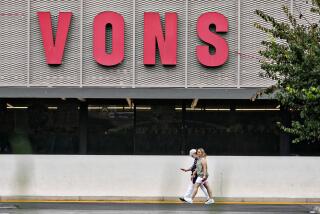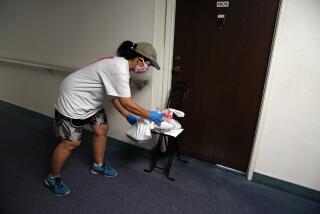Supplies Dwindle at Affected Grocers
- Share via
Five lonely bananas. A handful of packaged tomatoes. Four containers of mushrooms.
Ten days into Southern California’s supermarket strike, the produce shelves were bare at a Pavilions store in South Pasadena on Monday night. So were many of the market’s meat cases.
For the record:
12:00 a.m. Dec. 6, 2003 FOR THE RECORD
Los Angeles Times Saturday December 06, 2003 Home Edition Main News Part A Page 2 National Desk 1 inches; 41 words Type of Material: Correction
Supermarket strike -- In its coverage of the supermarket strike and lockout that began Oct. 11, The Times has said repeatedly that the labor dispute affected 859 union grocery stores in Southern and Central California. In fact, 852 stores are affected.
“We haven’t had a delivery in a week and a half,” said Craig Schilling, a meat clerk who was transferred to the store from Denver by Pavilions’ owner, Safeway Inc., when the strike began. “We’re keeping our fingers crossed that we’ll get one tomorrow.”
As sales have dwindled and pickets have blocked grocery distribution centers, the supply of perishable goods flowing into the region’s major supermarkets has slowed considerably -- in some cases by design.
Although the three major chains declined to comment on how the labor strife has affected sales and shipments, grocery vendors say they have cut way back on their deliveries and reduced shifts at their plants. At the same time, warehouse workers note that there’s been a rise in the amount of food being thrown away, and some charities say they’ve seen a big increase in the amount of goods being donated by the chains.
Safeway, the parent of Vons and Pavilions, says it’s deliberately keeping certain shelves thinly stocked.
For example, the company has been paring back its produce selection from 800 varieties to the 100 top-selling items. It’s also reducing supplies of dairy and bakery items.
In some ways, Safeway is relying more on vendors. Safeway spokeswoman Sandra Calderon said the supermarket chain was eliminating all meat cutting at its strike-affected stores. Because there aren’t enough meat cutters available, she said, the company is buying prepackaged ground beef and other meats from suppliers.
“We are going to all case-ready meats,” Calderon said.
Representatives of the region’s two other major chains -- Ralphs, owned by Kroger Co., and Albertsons Inc. -- declined to talk specifically about their supply and business practices since the United Food and Commercial Workers union launched a strike Oct. 11, affecting a total of 859 stores and 70,000 union employees.
Ralphs said, however, that its stores weren’t having trouble receiving deliveries.
“We are not having problems getting food to our stores,” spokesman Terry O’Neil said. “We are using our own trucks, and some of our business partners are electing to deliver products to our stores.”
On the Edge of Fresh
Still, supplies have been an issue at some Ralphs stores.
In San Diego County, a Ralphs manager stuck with a surplus of milk edging closer to its expiration date took it upon himself to rent an unrefrigerated truck and move it to a busier store in Chula Vista.
The move, which occurred over the weekend, was captured on video camera and prompted an investigation by the California Department of Food and Agriculture. Although the transferred milk was found to be undamaged, O’Neil said, the manager was disciplined for the action. O’Neil called it an “isolated incident.”
“That’s not something we do,” he said.
In other cases, Ralphs has tossed out food that could no longer be safely sold to consumers.
“Yesterday we threw away five semi loads full of product,” including baked goods, meat and produce, said Frank Halstead, a warehouseman at Ralphs’ perishables warehouse center in Compton.
The excess supplies have been a boon to some charities.
“My refrigerator and freezer are bursting at the seams,” said Adrienne Rimmel, food service manager at Cri-Help Inc. of North Hollywood, which operates two nonprofit drug and alcohol rehabilitation facilities. “We never get anything other than day-old bread from the stores.”
Now, however, Rimmel is receiving produce, meat, deli items, pastries and other goods from a number of Ralphs stores. “This is a real godsend for us,” she said.
Albertsons, for its part, said it was “committed to controlling shrink in its stores,” referring to the industry jargon for lost food.
Most of its stores operate a composting program to get rid of perishable waste. So when produce, eggs and other items have passed their expiration date, they are put on pallets and shipped to Bakersfield, where the goods are made into compost, bagged and returned to the stores for sale as fertilizer.
Yet with so much food going unsold, some of the goods are simply being thrown away.
At the Albertsons store on Avenue 45 in Los Angeles, replacement workers were tossing loaves of bread and other items from the bakery into dumpsters out front.
Some of the store’s vendors also reported pulling spoiled goods themselves.
“We are barely moving any tortillas,” said Adrian Rojas, a driver supplying Gruma Corp.’s Guerrero tortillas. “We are supposed to come once a day; now we only come once a week.”
And then, he noted, it’s mostly to pick up product that has passed its expiration date. These goods are a total loss for the company, Rojas said.
Some vendors are diverting some of their excess product to other chains not being picketed, such as Stater Bros. Markets, Gelson’s and Kroger subsidiary Food 4 Less. But many said not enough was being sold overall to prevent them from reducing production and cutting shifts at their plants.
Fewer Working Hours
Orders have been “off pretty steeply,” said Bill Zinke, vice president of marketing at Ready Pac Produce Inc., which sells packaged salads and other fresh goods. “We have had to limit the number of hours we work” at the Irwindale plant, he said.
At the major supermarket chains, there are signs that food at some stores is lingering too long as the number of customers has slowed.
In a Vons in South Pasadena, produce manager Eddy Gonzalez pointed out some fruit in the nearby produce aisle. “Those apples look like they have been there too long,” he said.
To keep goods fresh and in stock, Zinke said Ready Pac was trying to hire more delivery drivers.
But for the most part, people who work in the stores’ supply chain say shoppers will be seeing more perishable goods with expiration dates that are just days off rather than weeks away.
“They aren’t selling it,” said Ed Croker, a Teamsters union driver for Vons and Pavilions. Deliveries have been cut back about 80% at the Santa Fe Springs warehouse where he works, he said.
Robert Feenstra, executive director of the Ontario-based Milk Producers Council, said he too was surprised by how close to the wire the three chains were pushing the expiration dates.
Pulling into a Vons supermarket in Anaheim Hills on Sunday to pick up some milk, the dairy industry executive walked out after seeing that the “pull date” on the milk was coming up.
He said he then went to a nearby drug retailer, where the milk had an Oct. 31 pull date. And it was on sale, he said.
Times staff writers Jerry Hirsch and Lisa Girion contributed to this report.
--- UNPUBLISHED NOTE ---
On February 12, 2004 the United Food and Commercial Workers Union, which had stated repeatedly that 70,000 workers were involved in the supermarket labor dispute in Central and Southern California, said that the number of people on strike or locked out was actually 59,000. A union spokeswoman, Barbara Maynard, said that 70,000 UFCW members were, in fact, covered by the labor contract with supermarkets that expired last year. But 11,000 of them worked for Stater Bros. Holdings Inc., Arden Group Inc.’s Gelson’s and other regional grocery companies and were still on the job. (See: “UFCW Revises Number of Workers in Labor Dispute,” Los Angeles Times, February 13, 2004, Business C-11)
--- END NOTE ---
More to Read
Eat your way across L.A.
Get our weekly Tasting Notes newsletter for reviews, news and more.
You may occasionally receive promotional content from the Los Angeles Times.










